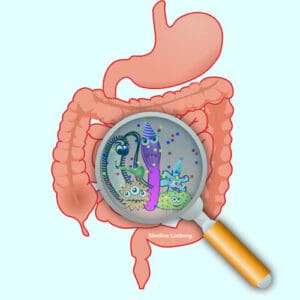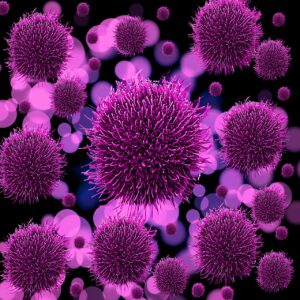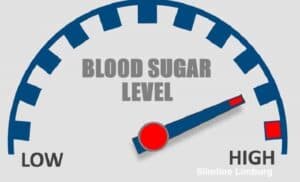Do you ask yourself: "Why am I so tired? What causes fatigue and what can you do about it.

I'm always tired! Sleep and relax. How do you actually sleep?
- Most of us know it's important to get a good night's sleep, but too few of us make those eight hours.
- If you hit that eight-hour threshold and you still feel exhausted, that's an indication that there is an underlying problem.
- Let's see why you are always tired. Looking at the causes of chronic fatigue, which I encounter in practice.
Why am I so tired test | 11 causes of long-term fatigue.
- Thyroid disorders
- Adrenal fatigue or overexertion
- Emotional stress
- Disturbed intestinal flora
- Viruses
- Stubborn bacteria
- Parasites
- Food intolerance
- Fluctuating blood sugar
- Sedentary lifestyle
- Heavy metal poisoning
1. Thyroid disorders
Thyroid disease can negatively affect just about any area of your life. The thyroid gland is vital for keeping your physical, mental and emotional life in balance.

Symptoms of the thyroid disease
- From weight problems to depression and / or anxiety
How Are Thyroid Diseases Caused?
There are probably 4 main causes of thyroid disease, which can be one reason you always feel tired:
- Hormonal imbalances caused by stress and nutrition
- Food intolerances such as gluten and dairy products
- Radiation exposure and toxicity
- A nutritional deficiency of iodine, selenium or iron (from a recent study), vitamin D may also play a role
How do I find out that I have thyroid disease?
Get your blood tested on TSH, fT3, fT4, Anti-TPO (to rule out Hashimoto and Graves) Do you have hypo - underactive thyroid or hyper - overactive thyroid?
What to do?
A tailor-made therapy is determined on the basis of tests and investigations.
2. Adrenal fatigue or overexertion

- Adrenal exhaustion is thought to affect up to 80 percent of adults worldwide and is caused by a hormonal malfunction.
- Adrenal glands are extremely important endocrine glands that release more than 50 different hormones, including the energy-regulating hormones cortisol and adrenaline.
What to do?
- Use: adaptogen herbs, vitamins C, B5 and B12, omega 3, vitamin D3 and zinc
- Less caffeine, sugar, carbohydrates.
3. Emotional stress
Emotional stress can have a huge impact on your energy levels, especially when stress progresses to the point of an anxiety disorder or a sleep-related problem.

Emotional stress and / or psychological causes:
- genetics
- brain chemistry
- diet and lifestyle habits
- it is also very common for someone with anxiety to have some form of depression and vice versa - this has a further negative impact on energy levels
- disturbed intestinal flora
What to do?
- get enough sleep and exercise
- avoid stimulants such as sugars and coffee
- use adaptogenic herbs such as rhodiola and ashwagandha
- nutritional supplements such as magnesium and B vitamins, probiotics
- consider a healthy diet
- think of traumas and emotional stress in the past.
4. Disturbed intestinal flora
The microbiome or gut flora is the bacterial ecosystem that lives in our body, in our gut.

What exactly do our gut bacteria do?
- Help produce hormones, such as, for example serotonin. Depressive symptoms can develop due to a lack of serotonin.
- Help in the extraction of energy (calories) and nutrients, including vitamins such as vitamins B, minerals, amino acids, fatty acids and antioxidants. Vitamins B are a source of energy.
- Dealing with our appetites and body weight
- Preventing us from getting colds and viruses. So contribute to it strengthen it immune system.
- Help repair damaged tissues and injuries
The result of the disturbed intestinal flora
A lack of healthy gut bacteria causes conditions such as
- Food allergy
- Asthma
- Diabetes
- Arthritis
- Fibromyalgia
- Eczema and psoriasis
- In some cases autoimmune diseases
- Leaking bowels (leaky gut)
- IBS (irritable bowel syndrome)
What to do to improve your intestinal flora?
Eat probiotic foods such as yogurt, kefir, cultured vegetables, and kombucha. Also consider taking a high quality probiotic supplement.
- My specialization is to balance digestion 🙂
5. Presence of viruses or antibodies such as mononucleosis or cytomegaly virus

Did you know that there are over 400 different viruses that can cause infections, including colds, flu, Pfeiffer, hepatitis, mononucleosis and HIV? And now the Corona virus
What is a virus?
A virus is a small infectious substance that can only replicate in the living cells of other organisms.
Viruses can infect all types of life - humans, animals, plants and microorganisms, including bacteria.
An annoying side effect of contracting a virus is that antibiotics do not work.
What to do to fight viruses?
Fortunately, there are a number of powerful antiviral herbs that boost the immune system, reduce inflammation, and fight infection. These include elderberry, echinacea, garlic, cat's claw, calendula or energetic drops.
In my practice, orthomolecular, energetic and homeopathic agents are successfully used to fight virulent infections. In which detoxifying organs such as liver, kidneys and lymphatic system are involved in this treatment.
6. Presence of stubborn bacteria

What to do against extreme fatigue? Think stubborn bacteria!
Bacteria are microscopic single-celled microorganisms found all around us. Most are harmless and many are useful. For example, bacteria in your intestines help to break down food. However, some types of bacteria can cause infections and they are difficult to get rid of, even with antibiotics.
Presence of stubborn bacteria such as H. Pylori, the stomach bacteria that can cause stomach ulcers and like E.coli that can cause urinary tract infection. These bacteria could lead to long-term fatigue.
In practice, natural antibacterial food supplements are used.
What to do?
Wash hands and use dietary supplements containing pre- and probiotics and probiotic-rich foods such as kefir or sauerkraut.
7. Parasites in intestines

Common Symptoms of Intestinal Parasites:
- Stomach ache
- Diarrhea
- Pulpy, variable, sometimes with mucus stools
- Nausea or vomiting
- Bloated stomach feeling
- Fatigue
- Unexplained weight loss
- Sensitive stomach
What are the parasites?
Parasites are usually acquired by consuming contaminated food or water. People with an unbalanced intestinal flora, leaking bowel syndrome or a weakened immune system are more susceptible to this.
What to do?
- Contact an expert
- Do it stool examination
- Use anti-parasitic agents such as black walnut, oregano, clove oil
8. Food intolerance or wrong diet

What is food intolerance vs allergy?
A food intolerance is the digestive system's response to foods you cannot tolerate. Response is palpable or visible after 1 or 3 days. Think of lactose intolerance, for example.
Bee a food allergy the body makes specific allergic antibodies against food allergens, reaction is quickly felt or visible. Think of nut allergies, for example.
What are food intolerance symptoms?
- The symptoms are varied and can include migraines, coughs and stomachaches.
- Sometimes food intolerance is caused by the lack of a certain enzyme.
What to do?
Try adding digestive enzymes in the diet such as pepsin, protease, or bromelain (from pineapple).
You can food intolerance test or try an elimination diet to find out which foods are making you sick or consuming your energy.
9. The Fluctuating Blood Sugar Level

Most people have fluctuations in blood sugar, which can be easily controlled. However, they are unaware that this is a major factor in their health problems and lack of energy.
Symptoms of the fluctuating blood sugar:
- fatigue or exhaustion
- feeling cravings for food, especially carbohydrates
- headache
- melancholy
- fear
- tremors after a few hours without food
Causes of blood sugar disturbed:
- poor diet (processed foods
- added sugars and simple carbohydrates
- type I & II diabetes
- pancreatic function
- parasites
- candida
What to do?
- Exercise before eating
- Less carbohydrates and more vegetable fats such as avocado, nuts, coconut fat and oils
10. Why am I so tired? Sedentary lifestyle!

In busy, office-oriented work environments, it is common for many people to develop a sedentary lifestyle.
What Causes a Sedentary Lifestyle?
- desk job
- lack of movement
- back problems
- chronic pain
- habit of sitting a lot
- lack of motivation
What to do?
Regular exercise can help balance hormones, improve insulin resistance, and help sleep better
11. Heavy metal poisoning

Symptoms of heavy metal poisoning
- Fatigue
- Loss of appetite
- Digestive problems such as IBS
How do you test heavy metal toxicity?
- Most reliable test is through her
- The hair analysis gives an impression of the exposure to toxic metals in recent years
- Also amount of healthy minerals such as zinc and selenium
Why am I so tired? What is a holistic approach?
The holistic approach not only treats symptoms, but tailor-made solutions are sought through an in-depth analysis of the causes of the fatigue complaints, which can mainly be caused by nutrition, food intolerance, intestinal disorders, unhealthy intestinal flora and hormonal disturbances.
Intensive use is made of laboratory tests and extensive questionnaires to determine further therapy.
My therapy is always personal because every person is unique and consists of:
- Correct diet and lifestyle to adjust
- Eliminate inflammation and inflammation-promoting foods
- Conduct lab tests as needed
- Clean up viruses, parasites and bacteria
- Detoxify and support liver, kidneys and lymphatic system
- Improve intestinal function and intestinal flora
- Treat unprocessed emotions
As a PhD in metabolism and nutrition combined with an education in othomolecular medicine and years of experience in this, you have come to the right place 🙂
webinar. Why am I so tired? Hormonal stress.

- Natural remedies for diarrhea
- 7 days of detox for your liver
- Remove heavy metals
- Lab exam
- Vitamin B12 deficiency?
- I'm always tired
- Why am I so tired test
- What to do against extreme fatigue
- Meditation for Organs
- Do you have healthy intestines?
- A spiritual journey to yourself
- Why am I tired
- Treating PTSD

